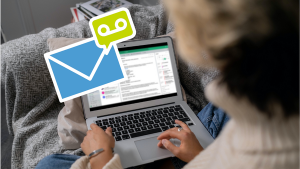 Picture this: you’ve been trying to nail down some details for what feels like weeks, sending emails and playing phone tag.
Picture this: you’ve been trying to nail down some details for what feels like weeks, sending emails and playing phone tag.
The good news is that you finally have a voicemail with all the details. The bad news is that the voicemail is on your office phone on campus. And you’re not on campus.
It’s easy to envision what would happen next: driving in just to listen to a voicemail and hoping that it really is worth the trip. That is, if you weren’t using voicemail to email.
The University is undergoing a major overhaul of phone services, and moving from one provider, Verizon, to another, AT&T. The University’s contract with Verizon ends in 2023 and Verizon will no longer be providing the service the University uses. This gave ITS Voice Services the opportunity to evaluate other providers, ultimately saving money and providing additional features that support mobile and remote work settings. One of the new features is an upgraded voicemail to email service. When enabled, this means that all voicemails will be sent to your email as a .wav audio file. So that voicemail sent to your office number is available anywhere you have access to your UNC-Chapel Hill email, including your smartphone. The audio files are easy to replay and save for later. When voicemail to email is turned on, voicemails will go only to your email. They will not appear or be available on your phone. Moving all the campus phones from Verizon to AT&T is a huge undertaking. So far, ITS has migrated nearly 14,000 of the total 17,000 phones in the project and the project team expects to complete all ports by early 2024. ITS kicked off the migration in August 2020 by moving 7,500 nonworking numbers to the new phone system. In early May 2021, ITS started moving phone lines, by building, in groups of approximately 2,500. Migrating the phone service has multiple parts. Transferring the phone numbers from one service to another, also called porting, is a complicated process and is highly regulated by the FCC. When everything goes smoothly, it takes 55 days to port a number. Then, the ITS Transport Operations team must go to each building, locate and remove old phones and install new ones. Read about ITS’ latest migration and what’s involved in porting phones. Voicemail to email is turned off by default, due to the risk of potentially exposing sensitive information. Users must opt in to voicemail to email service after understanding the risks. Many University employees have phone conversations, and potentially voicemails, that contain sensitive information. Sensitive information can include credit card numbers, personally identifiable information or health information. Sensitive information should never be saved or transmitted unencrypted via email. So if you handle sensitive information, classified as Tier 2 or Tier 3, you should not enable voicemail to email because the .wav files are not encrypted. For examples of sensitive information that should not be sent or received using email, review the Information Classification Standard. Remember that all University email, including voicemail to email, is discoverable and can be subject to a public records request. If you’re interested in turning on voicemail to email and do not handle sensitive information, submit a request to the Voice Services team at help.unc.edu after your new phone is installed. For more information or additional help on voicemail to email or your new phone’s other features, visit New and Enhanced Phone Services. .wav to the rescue
 Keep sensitive data safe
Keep sensitive data safe Requesting service
